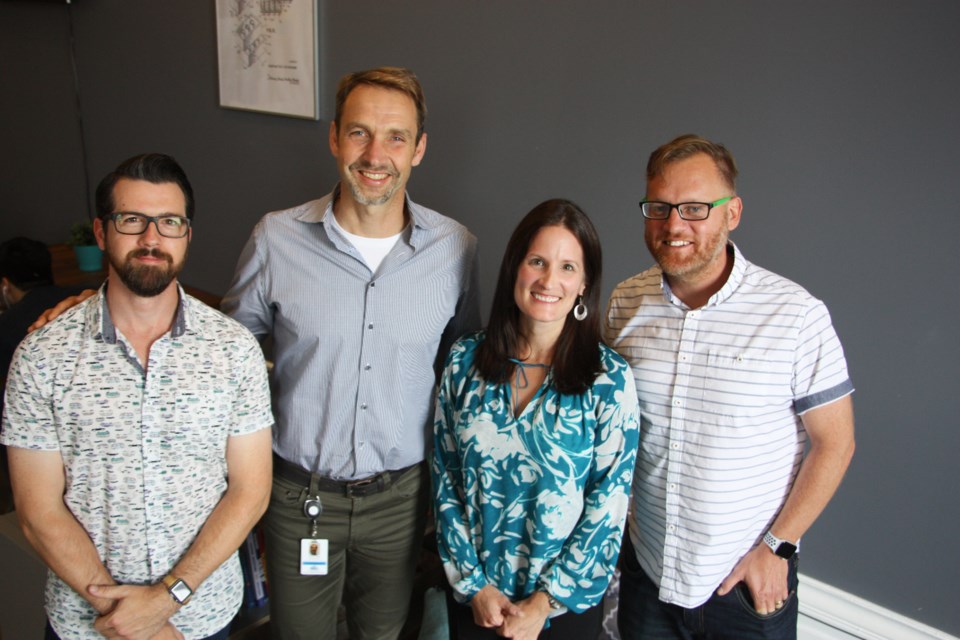Collingwood entrepreneurs are partnering with public and non-profit sector organizations on a plan to make Collingwood a place for businesses to grow.
The town’s private and public sector have identified a gap in service for business in Collingwood, and hope to close that gap with a business accelerator.
An accelerator is a program for existing small business owners offering hyper-focused programming over a set amount of time (for example, six months) and includes things like access to a network, information on funding, mentorship, access to office space during the program, and graduation support to help keep the company in Collingwood.
So far, the team behind the accelerator idea includes Martin Rydlo, the town’s director of marketing and business; Gillian Fairley, general manager of the Centre for Business Economic Development; David Reynolds, owner of Creator’s Cafe and other software companies; and Brandon Houston, owner of Switch Video and Collingwood Foundry co-working space.
Reynolds said an accelerator is meant for local entrepreneurs who are a few steps ahead of starting a business and coming up with a business plan.
“The accelerator is there to help and existing business step up to the next level,” said Reynolds.
Houston said a good accelerator produces business growth in the community.
“It’s a specified program, and you should be able to exit and successfully be able to scale,” he said.
An accelerator would, for example, form partnerships with post-secondary institutions for skilled labour, with investors for funding, with developers for space needs, and the list goes on.
“We’ve been asked many times why Collingwood doesn’t have an accelerator,” said Fairley. “Partnerships have developed over time, and now the timing seems right … businesses in Collingwood do well on startup, but there’s a gap in service with helping companies accelerate in growth.”
The idea is not only to help businesses grow, but, said Fairley, to create a business “eco-system” that helps draw investment, labour, and specific kinds of commercial development to Collingwood that will remove some of the challenges to business growth.
Reynolds said some of the challenges he’s seen as a local entrepreneur are in the areas of available space and labour. He’s hoping an accelerator will help provide solutions to both those challenges for him and other entrepreneurs.
Hiring a consultant is the first step toward starting an accelerator in Collingwood and finding a niche for Collingwood’s accelerator to carve out. Rydlo said the area is already attractive because of the lifestyle it provides, but that’s not enough to make it stand out for business growth.
According to a presentation made by Rydlo and Fairley to Collingwood council in September, a consultant would validate an ideal approach for an accelerator by engaging with a variety of different stakeholders to outline specific needs. The consultant’s work would also include preparation of a private-public partnership model and helping to establish a non-profit governance structure for the accelerator.
Without a consultant’s expertise, the group doesn’t know exactly what type of focus the Collingwood accelerator will take, but Fairley said the area already attracts tech business, particularly in the area of health and water.
She referenced a stormwater management pilot project by Greenland Engineering. There’s also Iso Water, a Collingwood-based company built around sales and research of heavy water. The Iso Water research and development department looks into ways heavy water can be used in pharmaceuticals.
"We want to build on momentum we already have, and these are areas we're seeing develop," said Fairley.
With a focused accelerator and an updated economic development action plan, Rydlo said Collingwood can better establish itself as an attractive and unique place to do business.
“The tricky part is figuring out: how do we work cohesively?” said Rydlo, adding the impacts of things like the action plan and the accelerator will ripple into town policies such as the official plan and even a zoning bylaw to make sure there are spaces in town available for the types of businesses the town is actively trying to attract.
“It’s about changing the ways developers are thinking about Collingwood,” said Rydlo. “Supply and demand will dictate what is needed, but if they don’t know what’s going on, they can’t know what’s needed.”
Rydlo estimates the physical space required for the accelerator program is about 8,000 square feet, which includes space for the Centre for Business and Economic Development and its partner organizations as well as offices for the businesses participating in the accelerator, meeting rooms, and programming/multi-use space. However, he said the accelerator could work around space needs temporarily. The priority would be to hire a manager for the accelerator program.
Rydlo has received permission from Collingwood council to apply for a $50,000 grant from the County of Simcoe’s economic development program for the accelerator. If successful, Rydlo said the town would partner with the Centre for Business and Economic Development to hire a consultant (using the grant money) to determine what accelerator programming would work best in Collingwood and how to build it as a public/private partnership.
“Joining together as public and private industry, we can get a little more velocity,” said Reynolds, adding the accelerator would become its own entity run as a non-profit organization.
“The sense of collaboration is here,” said Rydlo. “That is a huge leg up.”
Rydlo’s department has applied for funding for the accelerator consultant to the county, but won’t know until likely the new year whether or not it was successful.
